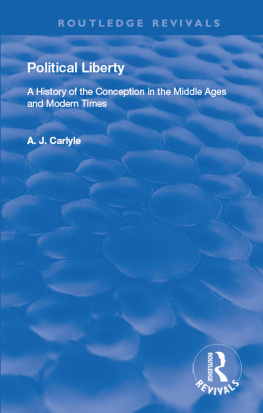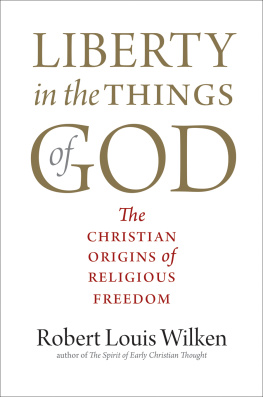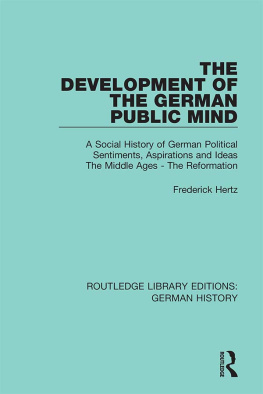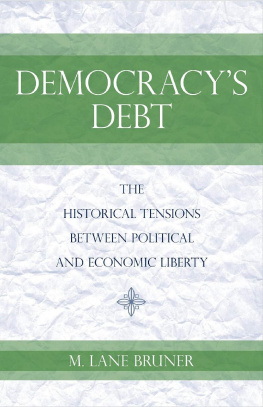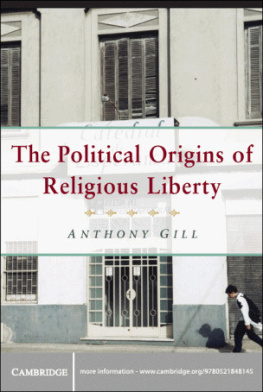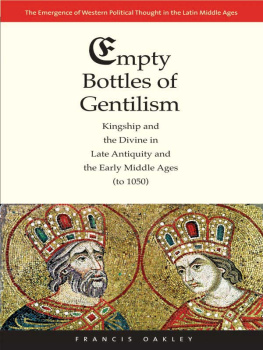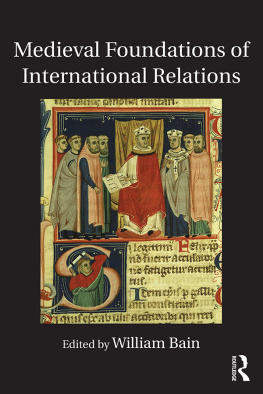Routledge Revivals
POLITICAL LIBERTY
POLITICAL LIBERTY
A HISTORY OF THE CONCEPTION IN THE MIDDLE AGES AND MODERN TIMES
BY
A. J. CARLYLE
First published in 1941 by The Oxford University Press
This edition published in 1963 by Frank Cass & Co. Ltd.
This edition first published in 2018 by Routledge
2 Park Square, Milton Park, Abingdon, Oxon, OX14 4RN
and by Routledge
52 Vanderbilt Avenue, New York, NY 10017, USA
Routledge is an imprint of the Taylor & Francis Group, an informa business
1941 by Taylor and Francis
All rights reserved. No part of this book may be reprinted or reproduced or utilised in any form or by any electronic, mechanical, or other means, now known or hereafter invented, including photocopying and recording, or in any information storage or retrieval system, without permission in writing from the publishers.
Publishers Note
The publisher has gone to great lengths to ensure the quality of this reprint but points out that some imperfections in the original copies may be apparent.
Disclaimer
The publisher has made every effort to trace copyright holders and welcomes correspondence from those they have been unable to contact.
A Library of Congress record exists under ISBN:
ISBN 13: 978-0-367-17912-0 (hbk)
ISBN 13: 978-0-429-05842-4 (ebk)
POLITICAL LIBERTY
POLITICAL LIBERTY
A HISTORY OF THE CONCEPTION IN THE MIDDLE AGES AND MODERN TIMES
BY
A. J. CARLYLE
First published by
The Oxford University Press in 1941
This edition published by Frank Cass & Co. Ltd.
10 Woburn Walk, London W.C.1
First published 1941
New impression 1963
Printed by Charles Birchall & Sons Limited
Liverpool and London
CONTENTS
PART I
INDIVIDUAL AND POLITICAL LIBERTY IN THE MIDDLE AGES |
PART II
THE CONCEPTION OF POLITICAL LIBERTY IN THE SEVENTEENTH CENTURY |
PART III
THE DEVELOPMENT OF THE CONCEPTION OF POLITICAL LIBERTY IN THE EIGHTEENTH CENTURY |
T HERE is a vulgar opinion that the conception of Political Liberty, however important it may have been in Athens and Republican Rome, disappeared in the period of the Roman Empire and in the Middle Ages, and has only been recovered in the last two centuries.
There are even some who think that the pursuit of Political Liberty is only a passing phase, an abnormal development, and that all that is needed for the development of civilization is authority and force. Whatever may be the place of authority and force in a rational order, to any serious student of human nature and human history, the notion that it is mere force which has created, and which holds together human society is an absurdity, an irrational and stupid absurdity. And the notion that the pursuit of liberty is a merely passing phase of Western Civilization is equally absurd.
Some men have found themselves unable to admit that we can trace any clearly marked progress in European civilization, any normal line of development. To myself it seems evident that the history of civilization during the last two thousand years is primarily the history of the development of liberty, interrupted indeed on its political side by a curious but passing phase of absolutism in the seventeenth and eighteenth centuries, but this fell to pieces under the weight of its inherent absurdity and incompetence.
In another work my brother and I have endeavoured to write a history of Political Theory in the Middle Ages, and while, in doing this, we had little if any conscious intention of writing the history of the theory of Political Liberty in those centuries, yet that is what we have actually done. This work is primarily an attempt, but on a much smaller scale, to set out the continuity of the development of the conception of Political Liberty during the Middle Ages and the seventeenth and eighteenth centuriesthe development, but even more, the continuity of the development, for this has been inadequately appreciated.
It is, however, true that it is impossible to deal with the conception of Political Freedom without some reference to the meaning of the larger and more complex subject of Individual Freedom, not indeed in the more strictly philosophical sense, but in the sense of the relation of the authority of the political society to the individual; for it is clear that anyone who considers the history of political authority finds himself confronted with the question how political and individual freedom are related to each other.
We must therefore begin by taking account of the fact that, while we shall be occupied primarily with the history of the European conception of Political Liberty in Medieval and Modern Times, a great development in the conception of the relation of the individual to the society had been taking place in the centuries which preceded the fall of the Roman Empire in the West. I find it impossible to think that this development of the conception of the equal personality of human beings had no relation to the development of the conception of Political Liberty.
PART I
INDIVIDUAL AND POLITICAL LIBERTY IN THE MIDDLE AGES
T HERE are few contrasts in literature more impressive or more suggestive of some profound change in the temper of men than that between the words of the Second Commandment and those of the prophet Ezekiel.
I the Lord thy God am a jealous God, visiting the iniquity of the fathers upon the children, upon the third and upon the fourth generation of them that hate me.1
These are the words of Exodus, while Ezekiel says:
The word of the Lord came unto me again saying, What mean ye that ye use this proverb concerning the land of Israel, saying, The fathers have eaten sour grapes, and the childrens teeth are set on edge? As I live, saith the Lord, ye shall not have occasion any more to use this proverb in Israel. Behold all souls are mine; as the soul of the father, so also the soul of the son is mine, the soul that sinneth, it shall die. The soul that sinneth, it shall die, the son shall not bear the iniquity of the father, neither shall the father bear the iniquity of the son; the righteousness of the righteous shall be upon him, and the wickedness of the wicked upon him.2
The contrast is impressive and arresting, the one represents the conviction of the solidarity of the continuous group, the other the distinctiveness of the individual, and his moral responsibility. This is only the more arresting when we observe that, after our first almost instinctive feeling that Ezekiels words correspond with our judgement of what would be right, we go on to remember, uneasily perhaps, that the words of the Second Commandment are after all strangely near the facts of our human experience. For we may think that the individual and he alone should experience the consequences of his good deeds, of his mistakes, or wrong doings, but we know that in the world as it is, it is not so, but that the good or evil that men do lives after them. And, if we think a little more deeply, we know that we would not have it otherwise. We know that we do not live in solitude and in isolation, but in and through each other, that we are bound to each other by ties which we would not break if we could. It is not merely the ties of a hard necessity which bind us to each other, but the ties of that love which is the greatest quality of human nature.

